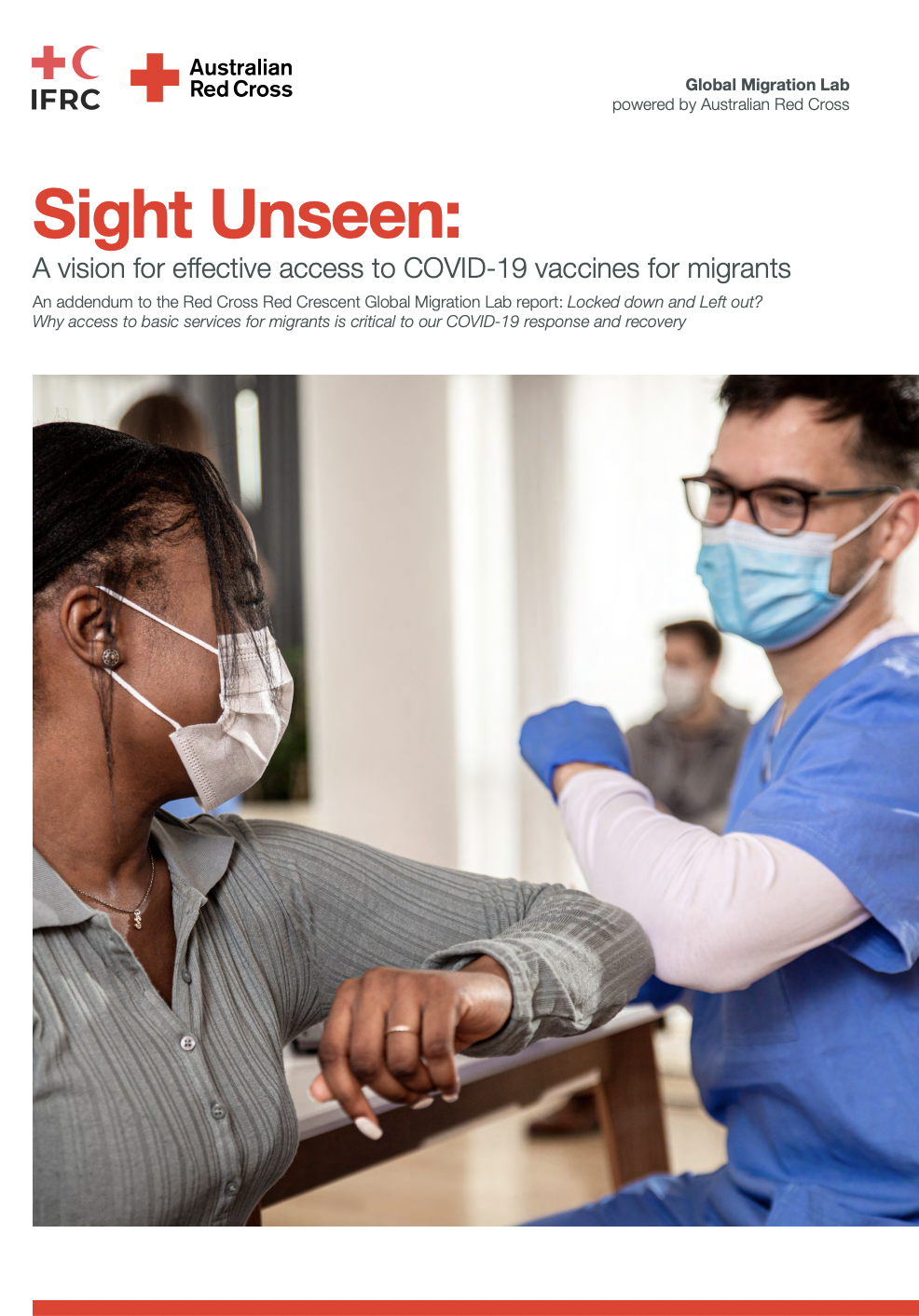Sight Unseen: A vision for effective access to COVID-19 vaccines for migrants
Description
It has been over three months since the Red Cross Red Crescent Global Migration Lab released its first report in early March 2021, on the impacts of COVID-19 and related policy measures on migrants and their access to basic services. At the time of publication, countries were just starting to develop their COVID-19 vaccination policies and strategies – some inclusive from the outset towards migrants, others directly or inadvertently exclusionary.
This addendum builds on the findings of that initial report and aims to take stock of the current global trends with respect to COVID-19 vaccines access for migrants. It draws on publicly available data from a range of sources, including research organizations, governments, the United Nations, media and civil society organizations, complemented by insights and case studies from a survey of 52 National Red Cross and Red Crescent Societies (National Societies) working directly with migrants and host communities around the globe.
There are varying degrees of inclusion in terms of vaccination policies around the world, but many states have increasingly recognized the importance of ensuring everyone has access to COVID-19 vaccines. Several states have responded to recommendations from the international community and calls for vaccine equity by revising and expanding their COVID-19 vaccination plans and strategies. However, while exact datasets and statistics vary, what is clear is that coverage for all migrants in vaccination plans and rollout strategies is far from universal.
Often, it is only certain groups of migrants which are included while others, particularly undocumented migrants, are not.
Moreover, inclusion in policy does not necessarily translate into access in practice. The report outlines that the longstanding barriers, both formal and informal, pre-dating the pandemic have not disappeared. They continue to impact safe and effective access to COVID-19 vaccines for migrants. Despite improving access in policy, the main barriers reported by National Societies surveyed for this research relate to: (1) information, outreach and language barriers; (2) vaccine hesitancy due to fears of side effects; (3) lack of documentation and complex registration processes; (4) fears of arrest, detention or deportation; and (5) limited vaccine supply.
National Societies are working around the globe to address these barriers. Of those surveyed, 87% are involved in information sharing and awareness activities for migrants on where and how to access COVID-19 vaccines; 77 % are supporting migrants to register or attend vaccination appointments; 70% are involved in direct advocacy with government and policy-makers for greater inclusion of migrants; and 60% are specifically tackling vaccine hesitancy.
Policy must translate into practice. Ensuring everyone has access to COVID-19 vaccines is not just the right thing to do, from a moral and humanitarian perspective, it is also the smart thing to do, from a health and socio-economic perspective. To protect everyone, measures to ensure equal and equitable access to and uptake of COVID-19 vaccines must be in place, particularly for migrants in vulnerable situations facing exacerbated (and new) barriers to basic services, including COVID-19 vaccinations.
States and civil society must work together in partnership with migrants and their communities, seeking and listening to their advice and guidance on how to address barriers, tailor approaches and rollout strategies and communicate effectively to promote and facilitate access to COVID-19 vaccines. Based on the global review presented in the report and the insights from and experiences of National Societies operating on the ground with migrants and host communities, it is recommended that states work with local partners to:
1. Provide safe and equitable access to COVID-19 vaccinations for all migrants, irrespective of status and without
discrimination; ideally free of charge for everyone.
2. Understand informal and formal access barriers at the local level, adopt measures to overcome these barriers, and establish procedures that facilitate equitable access to vaccination for migrants, including undocumented migrants. This includes developing alternative registration options, increasing flexibility of registration requirements and creating safeguards to ensure that information provided to healthcare providers during vaccination is not shared with or used for immigration enforcement.
3. Invest in and provide targeted outreach and public health messaging and information on COVID-19 vaccinations to
migrants in accessible channels, languages and formats, including through digital, online and face-to-face and fixed and mobile initiatives.
4. Undertake further research on vaccine hesitancy among migrant communities to inform and design strategies to
counter reservations and increase vaccine uptake.
5. Prioritize the most vulnerable, based on needs and levels of risk to COVID-19, not on migration or legal status.
Additional languages

DETAILS
Publication
Authors
Emergency
Language
Region
Keywords

